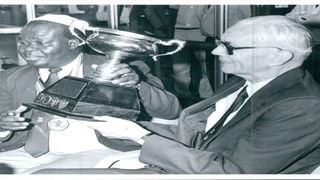
It's all smiles for Chairman of the East African Breweries Limited, B.H. Hobson (right) holding trophy won by the Kenya Breweries team at East and Central Africa Club Championships while Club Chairman Ahmed Adam, looks on at Jomo Kenyatta Airport in this undated file photo.
| File | Nation Media GroupTalkUP!
Premium
KBL boss who shrugged off a Caf beer advertising ban
What you need to know:
- Hobson believed sport was the best activity available to any group of people who desired to work as a team and this ethos was practiced in the company to telling success
- Hobson, the chairman, was a lifelong sportsman while his number two, Kenneth Matiba, who would succeed him later, was the nearest one could get to a sports fanatic
- It is no wonder then, that Tusker Village Ruaraka became the place in Kenya with the greatest concentration of international sports stars participating in the widest variety of disciplines
Sometime in 1986, the Confederation of Africa Football (Caf) banned the display of alcohol and tobacco advertisements on stadiums hosting its matches because of what it described as “the nefarious effects these products have on sportsmen’s health.”
As soon as I read the edict, I placed a call to Ruaraka, home of East African Breweries which was at that time Kenya’s biggest company and by dozens of kilometres the leading sponsor of sport in the country. In short order, I had an appointment with Brian Hobson, the company’s chairman.
Hobson was a tall, affable, cigar-smoking gentleman who had a habit of planting his right foot on the edge of his working desk as he spoke. This made it easy for him to lean backwards and forwards on his swivel chair as he searched for the right words to respond to my questions.
Without doubt, he was enjoying the interview for which he had evidently prepared well in the short period between the phone call and my presence in his well-appointed office. He rarely referred to the fact sheet on his desk; he just handed it to me with a nice smile at the end of the interview without letting go of his cigar.
He was the playing patron of the company’s lawn tennis club, which put people much younger than him to shame. He was also an avid player of bridge.
At that time, Breweries was maintaining 12 sports and two cultural clubs at an annual cost of over Sh5 million (equivalent to about Sh480 million). In those years, sport was not a budget item marked corporate social responsibility. It was company culture, every inch as important as bottles rolling out of the production line and employees who doubled up as sportsmen and women lived the charmed life.
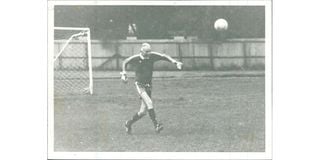
East African Breweries chairman Brian Hobson during a training session at Ruaraka in this undated file photo.
They couldn’t ask for better people at the top of the company. Hobson, the chairman, was a lifelong sportsman while his number two, Kenneth Matiba, who would succeed him later, was the nearest one could get to a sports fanatic. The human resources director, Maj (Rtd) Marsden Madoka, was the long serving chairman of the Amateur Boxing Association of Kenya in addition to being the chairman of the Outward Bound Trust of Kenya.
With such a leadership, the company’s hiring policies had a strong bias for sports people. In fact, it was Madoka himself who told me that this was the case.
He said: “When it comes to hiring people, the starting point was merit. We take the most qualified. But if two people are equally qualified and one of them is a sports man or woman and the other one is not, we straightaway take the sports person.”
“Drink and play go very well together,” Hobson told me, pouring cold water on Caf’s newly-proclaimed ban. “We are a local company making consistent profits and enjoying excellent working relationships among our staff. We owe this to our sports programme.”
Sport, Hobson told me, is the best activity available to any group of people who desire to work as a team. It neutralizes negatives such as tribal, racial and religious differences while cultivating positives such as selflessness.
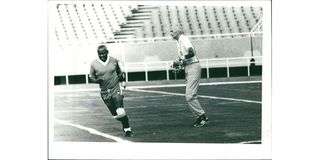
Brian Hobson (right) in his last competitive football match... keeping goal for Kenya Breweries management team against Kenyan parliamentarians team at Kasarani in 1987.
At Breweries, he said, sport brought junior and senior managers together with their subordinate staff in the playing field, quite often daily, in a healthy spirit that spread well beyond the pitches, courts and gyms and pervaded the offices.
As sincere communication went, junior staff did not have to wait until the company’s annual Christmas party to speak up after the fourth beer with its usual disastrous consequences. Opportunities for open communication were constantly available.
“We are a very efficient company,” Hobson told me, getting into the spirit of things.
“We attribute this to the spirit of togetherness among our staff. This spirit comes from our sports programme.”
Kenya Breweries’ involvement with sport was not unique, he pointed out. Brewing companies in many countries of the world had what appeared to be a natural gravitation toward sport. But even he, a decades-long employee of the biggest brewer in the region and now its chief, could only philosophize on the reason.
“Why beer tends to get along with sport is a slightly complicated question,” he said. “Sport is an exacting physical and mental effort that drains the body. I think it is natural that the body should want a refreshment drink after such an effort. Taken in sensible quantities, beer, with alcoholic content of less than five percent, provides that refreshment. Sportsmen are our good customers.”
As for “sensible quantities,” he could only say that “all things in life that give pleasure taken excessively will cause harm and beer is no exception.”
At the time I was speaking to Hobson, the Breweries operation was entirely amateur; of its 3,918 employees at that time, only seven were in employment directly for sport. Its 12 sports clubs spread out in Nairobi, Mombasa, Kisumu and Nakuru were football, boxing, hockey, netball, lawn tennis, darts, table tennis, rugby, volleyball, basketball, karate, and ajua. In addition, there was a cultural troupe and a company choir. All of them were open not only to employees, but their families as well.
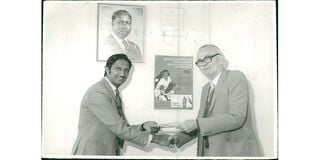
In this undated file photo, Kenya Lawn Tennis Association publicity officer, Vanraj Sarvaya (left), receiving a cheque for Sh30,000 from Brian Hobson, the chairman of Kenya Breweries the sponsors of the ongoing Kenya Closed Tennis Championships.
Football alone took up 29 percent of the sports budget. The company maintained three football teams in Nairobi, Mombasa and Kisumu. Kenya fans were most familiar with the one based in Nairobi, the present day Tusker FC.
It is an 11-time Kenya champion and finished runners-up in the 1994 Caf Africa Cup Winners Cup, a notable achievement.
When a major reorganization of company operations resulted in the dissolution of the sports programme, Tusker FC was the survivor. It has done reasonably well to justify the company’s faith but given the resources at its disposal and its longevity in the scene going back to 1970, it could have done better. It is the one that should have lifted the 18 Premier League cups won by Gor Mahia taking into account the record champions’ chronic problems. Tusker FC is an underachiever.
Boxing in Kenya today is a marginal sport. But in Brian Hobson’s day, it was big. Breweries spent nine percent of its sports budget on boxing, resulting in four out of five wins in the then robust national league.
The best three boxers to come out of Kenya were Robert Wangila, the 1988 Olympic welterweight gold medallist, Stephen Muchoki, the 1978 world light-flyweight amateur champion and Philip Waruinge, the 1968 (bronze) and 1972 (silver) Olympic featherweight winner. Wangila and Muchoki were Kenya Breweries boxers.
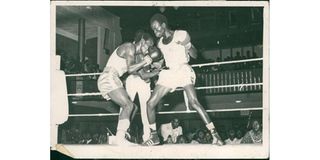
Kenya Breweries boxer Stephen Muchoki (left) goes defensive in this bout against an unidentified Ugandan boxer representing Kampala City Council at Nairobi City Hall, Muchoki won on points.
There were others, only slightly lesser in stature but towering above their countrymen. Names such as bantam weight Isaiah Ikhoni and Ibrahim Bilali, the 1982 Commonwealth Games light flyweight champion, come to mind.
Marsden Madoka had, probably still has, boxing flowing in his veins. “All those trophies,” he said, making a sweeping gesture at the full-to-overflowing trophy chest in his office, “belong to boxing alone. I am very proud of my boxers. That’s why I keep all the trophies they win. In the past, when they were scattered all over and they used to get lost. Now they are all together. When the day comes and I have to hand over to someone else, I want no complaints to follow me.”
None ever has. But unfortunately, he also seems to have taken into his retirement boxing success in the country. His was a firm and steady hand, trusted by corporates. He was liked, even loved, by boxers who saw in him a caring father figure.
He was deft at sports politics, knowing which buttons to press to keep the ABA ship on an even keel and decapitating opponents so painlessly that they could have used the final kicks of their dismembered ambitions to send him ‘thank you’ notes.
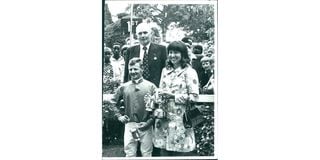
In this undated file photo, Brian Hobson, chairman of Kenya Breweries who is another well-known Kenya racing personality (centre), with winning jockey Kelleher (left) and trainer Mrs. Limb at one of the always-popular Kenya Breweries sponsored meeting at Ngong.
He reigned long and when he left, sponsorships dried up and the sport careened southwards in the direction of oblivion, in whose neighbourhood it remains to this day.
When researching for my book “Kick-Off: the game, the glory and the greats of Kenyan football,” I sought out Ellie Adero, one of the pre-eminent ambassadors of Tusker Village. Not only was he one of the longest serving Breweries players but he was also a winning captain of Harambee Stars. He was the Breweries coach who fell at the last hurdle in the 1994 Africa Cup Winners Cup campaign.
I asked Adero about the Breweries sports life of his day and his face lit up. “It was the best life anyone could ask for,” he told me. “The entire company breathed sport and those of us who played at the highest level enjoyed all the support we needed. The management fell over themselves to make us happy. Sometimes I don’t believe all that came to an end.”
Salute to Sports
For years, that dream world was headlined by activities such as the annual Kenya Breweries Festival of Sport in which units countrywide vied for various company cups.
Huge as it was, this extravaganza was still separate from others the company sponsored such the festivals of golf, racing, fishing and darts. And one of the most beautiful calendars to ever adorn my walls was the 1978 one themed Salute to Sports. It contained the kind of pictures you never have enough of because they define an era.
It is no wonder then, that Tusker Village Ruaraka became the place in Kenya with the greatest concentration of international sports stars participating in the widest variety of disciplines.
At the time that I was talking to Hobson, the Karate club had three international karateka - Josphat Maloba, Charles Onyango and Nelson Nguku. It's chairman Amos Ngure, was also vice-president of the Africa Karate-Do Association.

In this undated file photo, Kenya Breweries chairman Brian Hobson (left) hands over Perpetual Champion trophy to national darts champion Alex Kavisi of Bandari Darts Club, Mombasa.
Three players of the Breweries Netball Club – Anne Andai, Jamia Babala and Rose Atieno featured in the national team while its chairperson, Delilah Mathews held the same position for both Kenya and the East and Central African Netball Association.
The Breweries Hockey Club, which did not have a playing surface of its own, was the only all-African team to win the Jamhuri Cup and the prestigious M. R. D’Souza Gold Cup. Its top players, Fidelis Makhoha and Eric Otieno were in the 1984 Kenya Olympic team. The club chairman was Avtar Singh, the four-time Olympian and arguably the greatest player to hold a hockey stick in Kenya.
If it is hard to believe that there was a thriving darts Super League, it might be easier to accept that Breweries were the dominant club with Chris Njoroge rated as one of Kenya’s best players. Another regular national champion was the Breweries Ajua Club. Apparently, there was no sport too obscure for the attention of the sports enthusiasts who ran the company in those heady days.
After giving me exact figures of how much each club cost the company annually, Brian Hobson finally addressed himself to the Caf advertising ban. “Advertising does not get us more customers,” he told me. “Our products do not need to be advertised to attract more people. They take them in good times and in bad times.”
It was hard to argue with that.





